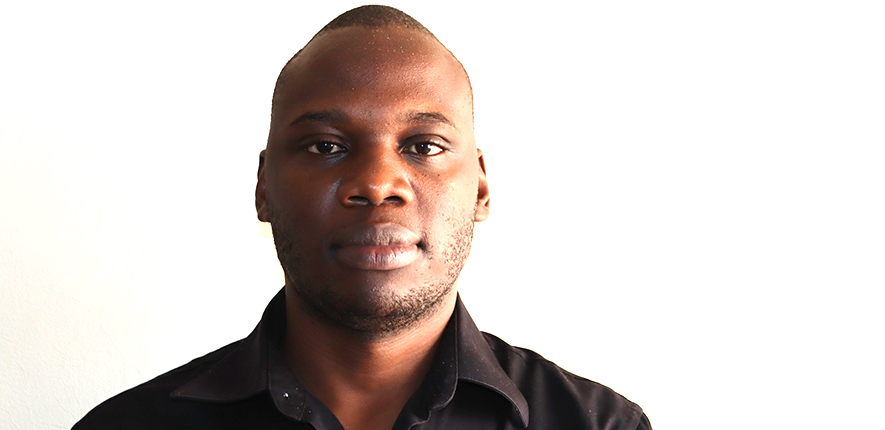
Submitted by Rachel Gardner on Wed, 25/05/2022 - 16:19
We're delighted to welcome Dr Peter Ochieng, a researcher in natural language processing and AI, who has just been appointed as the inaugural DeepMind Academic Fellow in Computer Science at the University of Cambridge.
Dr Ochieng is joining this Department from Taita Taveta University, Kenya, where he was a lecturer and postdoctoral researcher in the Informatics and Computing Department.
His Fellowship here has been made possible thanks to a donation to the University from leading British artificial intelligence company DeepMind.
The new DeepMind Fellowship is in addition to DeepMind Scholarships here that are supporting postgraduate students from backgrounds currently underrepresented in computer science.
Dr Ochieng conducts research in natural language processing, biomedical ontologies and AI. He is keen to leverage work in these areas to help the development of more apps in human and veterinary medicine and agritech that could benefit people living in Africa.
I am so excited to have this new role and to be able to come to Cambridge to meet new people and work with researchers who have expertise in different dimensions to me.
Dr Peter Ochieng
There are some significant hurdles to developing such apps currently, such as the challenges of processing the 60+ indigenous languages spoken across Kenya and East Africa. As English is one of Kenya’s two official languages, currently many apps developed in Kenya are in English.
"We want apps to use local languages," Dr Ochieng explains, "so that people are able to benefit from them properly." He cites as one recent example a GPS app used to guide people with visual impairments that has been written in the Kenyan language, Luhya.
The difficulties also include the need to develop conversational machine reading (CMR) tools that can process free text – a topic he has considered in recent research where he experimented with applying unsupervised learning techniques to develop conversational machine learning tools. He did this in the context of an app to help rural farmers diagnose disease in flocks of poultry, where the app needed to be able to handle both general questions ('What is the chicken suffering from?') and more specific ones ('Is it suffering from Newcastle Disease?').
There is also the need to compress the very large AI models used in apps so that they can easily be used on mobile phones over mobile internet.
"One of the areas I will be looking at is how we can compress these huge models so that they can fit in a resource-constrained platform," he says. "I'll be looking at a process called diffusion through which we can train a small model to learn from a much larger AI model."
To work on these issues, Dr Ochieng is eager to develop collaborations between research colleagues in Africa and Cambridge. "A pre-requisite of this role is collaboration so I’ll be looking for colleagues I can collaborate with across different domains," he says.
"I am so excited to have this new role and to be able to come to Cambridge to meet new people and work with researchers who have expertise in different dimensions to me."
Agritech applications
He would like to see such collaborations enabling a cross-fertilisation of ideas – both encouraging more researchers here to consider how their research could be applied in Africa, and encouraging further AI work in African universities.
"For example, agriculture is a key industry in this region and AI tools – if developed robustly and well-integrated here – could really help with tasks such as mapping crops in given areas with predictions of crop yield and soil fertility. These tools could really benefit farmers," he says.
Talented early career researchers like Peter play a vital role in the AI ecosystem, not only through their research contributions, but through their training and support for the next generation studying and working in AI.
Obum Ekeke, DeepMind
The creation of the new DeepMind Academic Fellowship here in Cambridge strengthens the existing relationship between the University of Cambridge and DeepMind.
Cambridge already runs a scholarship programme funded by DeepMind to help support and encourage individuals from groups currently underrepresented in computer science to pursue postgraduate education in the field.
Obum Ekeke, Head of Education Partnerships, DeepMind, says: "Building a thriving and representative AI ecosystem means thinking beyond access at the undergraduate and postgraduate level. Talented early career researchers like Peter play a vital role in the AI ecosystem, not only through their research contributions, but through their training and support for the next generation studying and working in AI.
"The DeepMind Academic Fellowship Programme is designed to support early career researchers, particularly those who are currently underrepresented in AI, to pursue postdoctoral study and enable them to progress to full academic or other research leadership roles in future. We’re delighted to continue our partnership with the University of Cambridge through this Fellowship programme and to welcome Peter in his new role."
Professor Ann Copestake, Head of this Department, says: "We are strongly committed to improving diversity in computer science both in this Department and the wider field. Recruiting the best people, including those who can act as role models to promote positive change, is absolutely key to this. So I am delighted that we have been able to hire Dr Ochieng as our first DeepMind Academic Fellow."
She adds: "His research is very exciting and there are groups both in this Department and across the University whose work is relevant to his and who will benefit from the collaboration. I am very grateful to DeepMind for their generosity in funding this important role."

